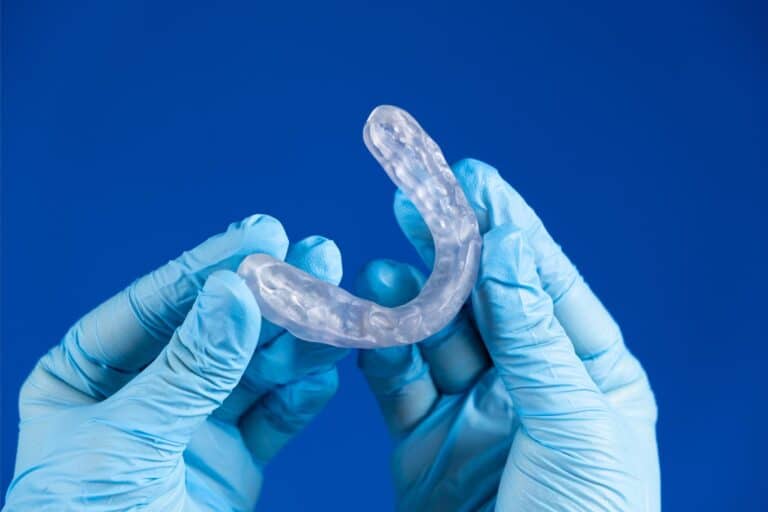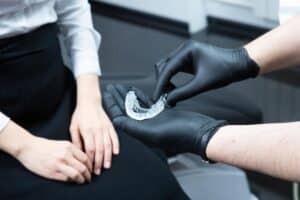Protect Your Smile with an Athletic Mouthguard for Braces
Playing sports is fun and rewarding, but there’s always a chance of a sudden hit or fall that can damage your teeth. For athletes with braces, the risk is even higher. An athletic mouthguard for braces is designed to shield both your teeth and your orthodontic appliances during practices and games. It gives you protection, peace of mind, and a way to stay focused on performance instead of worrying about injuries.
This blog will explain why mouthguards matter, what types of injuries they can help prevent, and how to choose and care for one that works best for you.
Why a Sports Mouthguard Is Essential for Orthodontic Patients
Braces add an extra layer of vulnerability when playing contact or high-impact sports. A bump to the face that might leave a small bruise for one athlete could mean a broken bracket or cut gums for someone with braces. A sports mouthguard for braces reduces the impact of collisions and helps protect your treatment progress.
Injuries caused by sports are not only painful but can also lead to expensive repairs. Brackets, wires, and alignments are delicate, and even a minor impact can interrupt months of progress. Protecting your braces helps ensure your orthodontic treatment stays on track and avoids unnecessary visits to the orthodontist.
Parents and athletes often overlook how much difference a properly fitted guard can make. It cushions the teeth, lips, and gums while giving athletes the confidence to focus on the game. Using an athletic mouthguard for braces isn’t just about safety—it’s about safeguarding the time, effort, and investment already put into treatment.
Added Protection Beyond Braces
A mouthguard does more than shield orthodontic appliances. It also lowers the risk of chipped teeth, lip injuries, and jaw discomfort. This extra level of protection can make the difference between finishing a season strong and sitting out with an injury.
Common Sports Injuries a Mouthguard Can Help Prevent
Athletes without protection often deal with injuries that could have been avoided. For those wearing braces, even minor contact can cause significant harm. An athletic mouthguard for braces provides a barrier between the teeth, gums, and soft tissues, reducing the chances of painful or costly damage.
One of the biggest concerns is broken brackets or bent wires. These issues not only hurt but can also set treatment back by weeks or months. Repairs add to the cost of orthodontic care and may mean more frequent visits to the office. A mouthguard helps limit these risks by absorbing the shock from hits, falls, or accidental elbows.
There’s also the risk of soft tissue injuries. Braces have edges that can cut the inside of the mouth when an impact occurs. With a proper guard in place, lips and cheeks are less likely to get caught on brackets or scraped by wires. This makes sports safer and more comfortable for athletes of all ages.
Examples of Preventable Sports Injuries
- Chipped or fractured teeth
- Broken brackets and bent wires
- Cuts to lips, cheeks, or tongue
- Jaw strain or discomfort
- Tooth displacement from heavy impact
Choosing the Right Fit and Material for Maximum Protection
Not all mouthguards are the same, and athletes with braces need one designed to fit comfortably over orthodontic appliances. A guard that’s too tight can press against brackets and cause damage, while one that’s too loose won’t provide enough protection. The right fit balances comfort, safety, and room for teeth to keep moving as treatment progresses.
Materials also matter. Guards made with high-quality, shock-absorbing material give the most effective protection against impacts. They should be durable enough to last through a season but flexible enough to feel comfortable during long practices or games. Choosing a guard made specifically for braces ensures the balance between protection and flexibility is right.
For many athletes, the biggest benefit comes from peace of mind. An athletic mouthguard for braces allows players to step on the field or court knowing their smile and orthodontic work are safer. With the right fit and material, it’s easier to stay focused on performance instead of worrying about dental injuries.
Caring for Your Mouthguard to Keep It Effective
A mouthguard only works if it’s kept clean and in good condition. After every use, it should be rinsed with cool water to remove bacteria and debris. Regular cleaning also prevents bad odors and extends the life of the guard. Skipping this step can lead to bacterial buildup that affects both oral health and the condition of braces.
Storage is just as important as cleaning. A vented case helps the guard dry out between uses and reduces the chance of mold or warping. Leaving it loose in a gym bag or locker can cause damage and make it less effective. Keeping the case handy encourages athletes to build a consistent habit of using and caring for their guard.
Replacing a guard when it shows signs of wear is also essential. Cracks, tears, or a loose fit mean it’s no longer protecting teeth the way it should. For athletes with braces, this becomes even more critical since orthodontic appliances add extra points of stress during impact. By treating it as part of sports gear, an athletic mouthguard for braces will always provide dependable protection.
Simple Care Tips
- Rinse with cool water after each use
- Brush weekly with a soft toothbrush and non-abrasive toothpaste
- Store in a vented case away from heat
- Inspect regularly for cracks or wear
- Replace if the fit changes or the material becomes damaged
Why Athletes Trust Carroll Orthodontics in Columbia, SC
Carroll Orthodontics is recognized across Columbia and the surrounding communities for expert orthodontic care. Led by Dr. Marshall Carroll, one of South Carolina’s top Invisalign providers, the practice was voted Best Orthodontist of 2025 by Irmo-Chapin Life Magazine. Families rely on their experience and commitment to creating healthy, confident smiles.
New patients can also benefit from a Free Smile Assessment Pack valued at $249, which includes digital x-rays and a complete smile analysis with treatment when scheduling an initial consultation online. It’s an easy way to get started on a safer, stronger smile.
Protect your smile both on and off the field. Schedule your free consultation with Carroll Orthodontics today.



